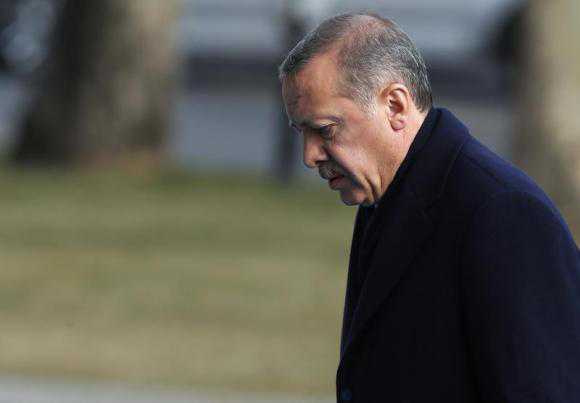
(Reuters) – Turkish Prime Minister Tayyip Erdogan’s government purged hundreds of police officers overnight, media said, as part of a crackdown on a rival he accuses of trying to usurp state power by tarring him with a specious corruption investigation.
Some of the officers, who included members of the financial and organised crime, smuggling and anti-terrorism units, were moved to traffic duties, according to the reports. Ankara police, chief focus of the action, declined to comment.
Despite the dismissals, among them senior commanders, police and prosecutors continued arrests, which on Tuesday targeted the state railway company and a western port.
Erdogan, facing the biggest challenge of an 11-year rule that has seen the army banished from politics, the economy booming and Ankara pressing its role in the Middle East, portrays the raids and arrests as a “dirty plot” by an Islamic cleric. The cleric backs no political party but exercises broad, if covert, influence in police and judiciary.
Details of accusations have not been made public, but are believed to relate to corruption in construction and real estate projects and Turkey’s gold trade with Iran, according to Turkish newspaper reports citing prosecutors’ documents. Prominent business people, the sons of three cabinet ministers and state officials are among those detained for questioning.
The government has hit back by sacking or reassigning hundreds of police across the country since the crisis broke with a day of raids and arrests on December 17.
A second investigation into large infrastructure projects championed by Erdogan, including a rail tunnel beneath the Bosphorus strait linking the European and Asian sides of Istanbul, has been blocked by government.
ECONOMIC IMPACT
Around 350 officers in Ankara, including members of the financial and organised crime, smuggling and anti-terrorism units, were dismissed or reassigned overnight to new roles including traffic or district duties, the media reports said.
According to the Hurriyet daily, some 1,700 police have been dismissed or reassigned in Istanbul and Ankara alone since the corruption investigations became public.
Some would have been directly linked to the inquiries, while others may have been removed because of links to the Hizmet (Service) movement of U.S.-based cleric Fethullah Gulen Erdogan now describes as an intolerable “state within a state”.
The two were close allies when Erdogan’s AK Party was first elected in 2002; but they have fallen out in the last couple of years over policy towards the United States and Israel and a recent attempt by Erdogan to close down the private schools that are the centre of a global Hizmet network.
Prosecutors meanwhile deepened their investigations, with at least 25 more people including public officials detained as part of an investigation into the activities of a port in the Aegean province of Izmir, broadcaster CNN Turk said.
Eight officials from the state railway company TCDD were among those detained in the raids, the company said in a statement, denying reports its headquarters had been searched.
“Neither side appears willing to give up at this stage in this high stakes battle for control of the state,” said Timothy Ash, head of emerging markets research at Standard Bank.
The corruption scandal is shaking investor confidence at a time when the lira currency is languishing around record lows, inflation is rising and growth slowing. As much as its Islamist-rooted ideology, AK Party’s support has relied on its avowed commitment to fight corruption and its economic record.
Erdogan and the Hizmet movement which exercises influence through a network of contacts built on sponsorship of schools and other social and media organisations, accuse each other of manipulating the police and compromising the independence of the judiciary. Hizmet denies unleashing the investigation.
“Purges, or more accurately massacres, are being carried out of civil servants who are fulfilling their duties defined by the law,” Gulen said in a letter to President Abdullah Gul, written as the row intensified in late December but published by the pro-government Yeni Safak newspaper on Monday.
Erdogan, who has won three general elections and remains widely popular, casts the scandal as an attempted “judicial coup”, a foreign-backed plot by those jealous of his success.
The scandal – which exploded on December 17 with the detention of businessmen close to the government and sons of three cabinet ministers – has weakened Erdogan’s AK Party just before local elections due in March and presidential polls in August.
(Additional reporting by Orhan Coskun in Ankara; Writing by Nick Tattersall; Editing by Ralph Boulton)
